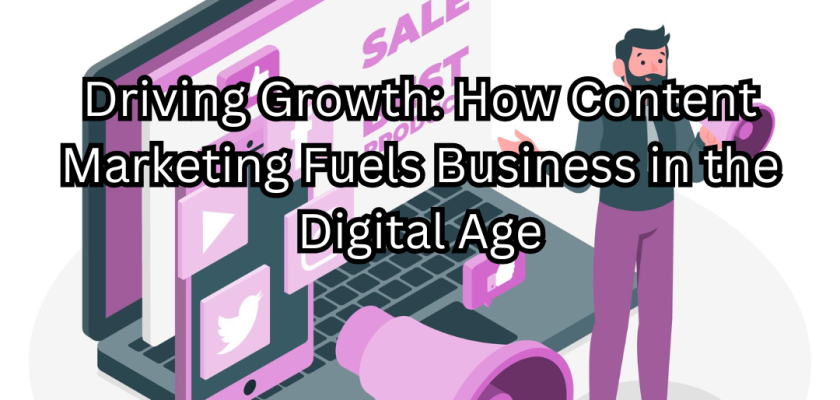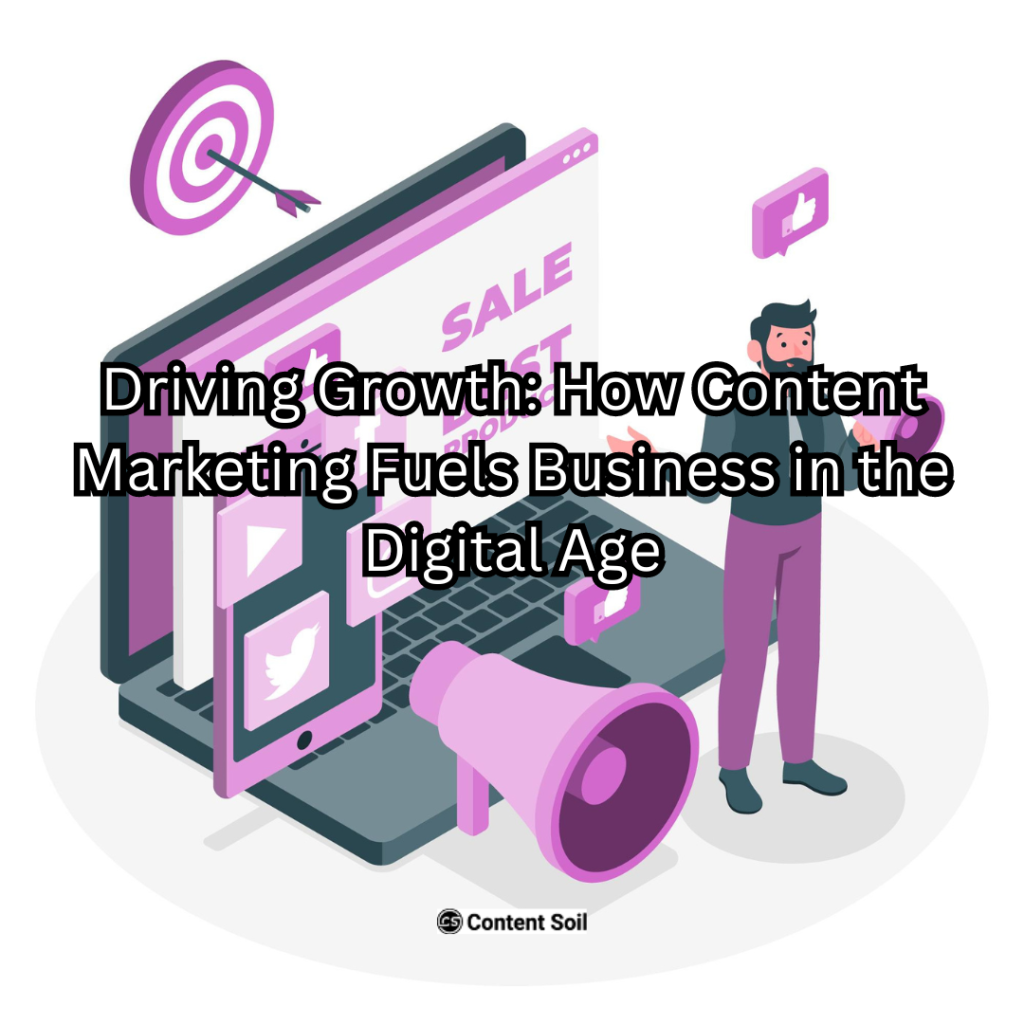Introduction:
In the rapidly evolving landscape of the digital age, businesses are constantly seeking innovative ways to engage with their audiences, build brand loyalty, and drive growth. One of the most powerful tools in this endeavor is content marketing. Unlike traditional marketing, which often relies on interruptive advertising techniques, content marketing focuses on creating valuable, relevant, and consistent content to attract and retain a clearly defined audience. This approach not only enhances customer engagement but also fosters trust and credibility, essential components for long-term business success.
Benefits of Content marketing :
Content marketing fuels business growth by aligning with the modern consumer’s preference for informative and engaging content. In an era where information is readily available at our fingertips, consumers have become more discerning and selective about the content they consume. High-quality content that addresses their needs and interests can significantly influence their purchasing decisions. By providing useful information, businesses can position themselves as thought leaders and trusted advisors, creating a loyal customer base that is more likely to convert into sales.
Furthermore, content marketing offers a multifaceted approach to reaching potential customers through various channels, including blogs, social media, videos, podcasts, and more. This diversification not only broadens a company’s reach but also enhances its visibility and search engine rankings. Effective content marketing strategies leverage these platforms to tell compelling stories, share expert insights, and engage with audiences in meaningful ways.
In essence, content marketing is more than just a buzzword; it is a critical component of a successful digital marketing strategy. By driving engagement, building trust, and ultimately influencing purchasing behavior, content marketing serves as a cornerstone for businesses aiming to thrive in the digital age.
How Content Marketing Fuels Business in the Digital Age
Enhanced Brand Awareness:
Creating high-quality content allows businesses to reach a broader audience. Through blogs, social media posts, videos, and other content formats, companies can share their brand story, values, and expertise. Consistently delivering valuable content helps build recognition and familiarity, making the brand more memorable. As potential customers repeatedly encounter the brand in various online spaces, their awareness and interest in the brand grow, setting the foundation for deeper engagement and loyalty.
Improved Search Engine Rankings:
Search engines prioritize websites that provide valuable, relevant content. By optimizing content for SEO (Search Engine Optimization), businesses can improve their search engine rankings, making it easier for potential customers to find them. This involves using relevant keywords, creating high-quality backlinks, and ensuring content is informative and up-to-date. Higher search engine rankings result in increased organic traffic, which can lead to more conversions and sales.
Audience Engagement:
Engaging content captures the interest of the audience, encouraging them to interact with the brand. This interaction can take various forms, such as comments on a blog post, shares on social media, or discussions in forums. Engaging content not only keeps the audience interested but also fosters a sense of community around the brand. This active participation enhances the relationship between the business and its customers, leading to higher retention rates and stronger brand loyalty.
Lead Generation:
Effective content marketing attracts potential customers by providing information that addresses their needs and pain points. Through gated content such as eBooks, whitepapers, and webinars, businesses can collect contact information from interested prospects. These leads can then be nurtured through targeted email campaigns and personalized content, gradually moving them down the sales funnel. By offering valuable content, businesses can attract high-quality leads who are more likely to convert into paying customers.
Customer Education:
Educational content helps customers make informed decisions by providing them with the knowledge they need to understand the products or services offered. This can include how-to guides, product reviews, tutorials, and industry insights. By positioning themselves as experts in their field, businesses can build trust and credibility, making customers more likely to choose their products or services over competitors. Educated customers are also more satisfied with their purchases, leading to higher retention rates and positive word-of-mouth referrals.
Building Trust and Credibility:
Trust and credibility are crucial for business success, especially in the digital age where customers have access to a plethora of information and options. By consistently delivering accurate, reliable, and insightful content, businesses can establish themselves as authorities in their industry. This credibility can influence purchasing decisions, as customers are more likely to buy from brands they trust. Furthermore, transparent and honest content helps build a loyal customer base that feels confident in their relationship with the brand.
Cost-Effective Marketing:
Content marketing is generally more cost-effective than traditional advertising methods. While creating high-quality content requires an initial investment of time and resources, it can yield long-term benefits. Once published, content can continue to attract and engage customers without ongoing costs. Compared to paid advertising, which requires continuous spending to maintain visibility, content marketing offers a higher return on investment by generating organic traffic and leads over time.
Support for Other Marketing Efforts:
Content marketing complements and enhances other marketing strategies. For instance, social media marketing relies heavily on sharing valuable content to engage followers. Email marketing campaigns can include links to recent blog posts or exclusive content offers. PPC (Pay-Per-Click) ads can direct users to landing pages with detailed content that encourages conversions. By integrating content marketing with other tactics, businesses can create a cohesive and effective marketing strategy that maximizes reach and impact.
Customer Retention:
Engaging and informative content helps retain existing customers by keeping them interested in the brand. Regular updates, newsletters, and exclusive content offers can make customers feel valued and connected to the brand. Additionally, providing continuous value through content helps reinforce the customer’s decision to choose the brand, encouraging repeat business and reducing churn rates. Loyal customers are also more likely to become brand advocates, promoting the business to others.
Data-Driven Insights:
Content marketing allows businesses to gather valuable data on customer behavior and preferences. By analyzing metrics such as page views, time spent on page, social shares, and conversion rates, companies can gain insights into what types of content resonate most with their audience. This data can inform future content strategies, enabling businesses to create more targeted and effective content. Additionally, understanding customer preferences helps businesses tailor their products and services to better meet market demands.
Conclusion:
Content marketing is a powerful strategy that drives business growth in the digital age by enhancing brand awareness, improving search engine rankings, engaging audiences, generating leads, educating customers, building trust and credibility, offering cost-effective marketing, supporting other marketing efforts, retaining customers, and providing data-driven insights. By leveraging these benefits, businesses can create meaningful connections with their audience, foster loyalty, and ultimately achieve long-term success in the competitive digital landscape.


